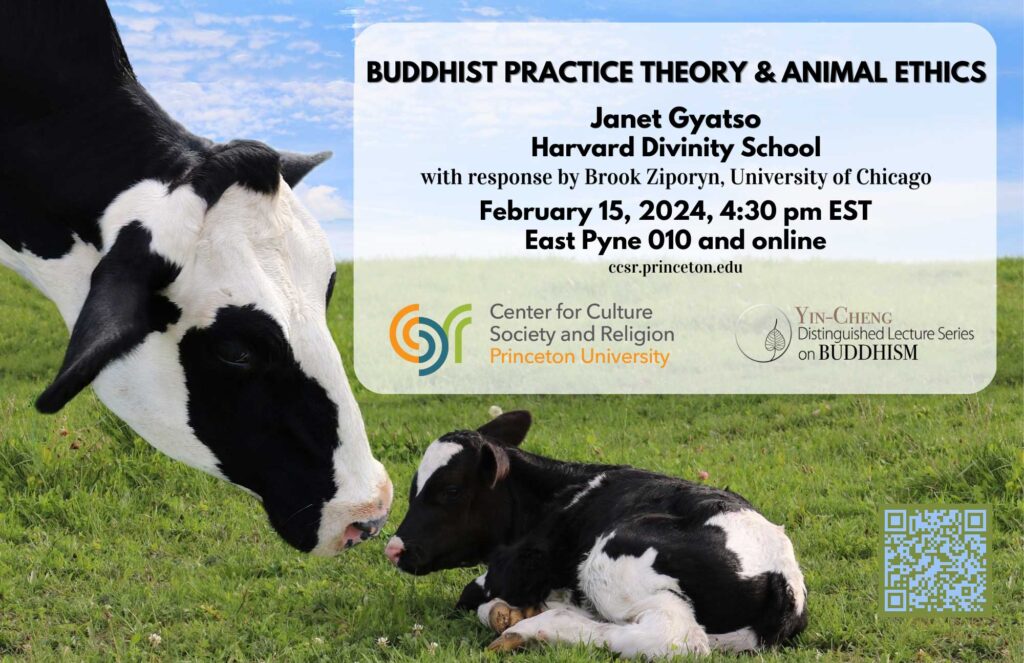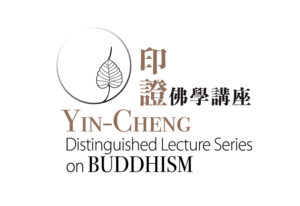Time: February 15, 1:30 pm (Vancouver) | 4:30 pm (New York) | 9:30pm (London) | 5:30 am (Beijing/Taipei)
Princeton University, East Pyne Building, 010
Janet Gyatso’s lecture in English
Abstract:
In this talk on Buddhism and animals I depart from the approach taken by Reiko Ohnuma in her recent book Unfortunate Destiny on animals in Buddhism. I am not going to be analyzing ideological and cosmological depictions of animals in Buddhist story literature. Rather, this talk will have real live animals today as its touchstone. It will zero in on one part of my current book project, which is on contemporary animal ethics. The section I will focus on has to do with practical resources from Buddhist traditions that I am seeking to mobilize, as part of the quest to end the current holocaust being visited upon farmed animals by humans today.
The talk will consider three main threads from Buddhist practice theory that are informing in my work: The first, unsurprisingly, has to do with the Buddhist virtue of compassion, in particular how it is activated by humans towards animals. The second considers what I am calling an aleatory life style. I think that animals excel at living life largely through the arts of happenstance and serendipity. What is ethical about that? Here I will explore the notions in Buddhist tradition of interdependence, or pratityasamutapada (especially in the pertinent colloquial Tibetan usage of the term rten ‘brel) and of auspiciousness, or mangalam, which has to do with making goodness. The third thread draws on some technical distinctions in Buddhist meditation theory. It is part of my effort to think through types of moral cultivation practices which people can use to train themselves to be animal advocates. How might we develop our moral conscience, as well as our intelligence, discernment and commitment to help animals effectively? The talk will cite Buddhist theorists Vasubandhu and Santideva among others, accompanied by my own musings
About the speaker: Janet Gyatso, Hershey Professor of Buddhist Studies (Harvard Divinity School)
 Janet Gyatso is Hershey Professor of Buddhist Studies and Associate Dean for Academic Affairs at Harvard Divinity School. Gyatso is a specialist in Buddhist studies concentrating on Tibetan and South Asian cultural and intellectual history. Her 2015 book Being Human in a Buddhist World: An Intellectual History of Medicine in Early Modern Tibet (Columbia University Press) focuses upon alternative early modernities and the conjunctions and disjunctures between religious and scientific epistemologies in Tibetan medicine in the sixteenth to eighteenth centuries. She has also been writing on sex and gender in Buddhist monasticism, and on the current female ordination movement in Buddhism. Previous topics of her scholarship have included visionary revelation in Buddhism; lineage, memory, and authorship; the philosophy of experience; and autobiographical writing in Tibet. Her current writing concerns the phenomenology of living well with animals and related ethical issues and practices. Gyatso was elected to the American Academy of Arts and Science in 2018. She was president of the International Association of Tibetan Studies from 2000 to 2006, and co-chair of the Buddhism Section of the American Academy of Religion from 2004 to 2010. She teaches on Buddhist history, ritual, and ideas, and on Tibetan literary practices and religious history. In both teaching and writing she draws on cultural and literary theory, and endeavors to widen the spectrum of intellectual resources for the understanding of Buddhist and Tibetan history. Gyatso earned her B.A., M.A., and Ph.D. at University of California, Berkeley.
Janet Gyatso is Hershey Professor of Buddhist Studies and Associate Dean for Academic Affairs at Harvard Divinity School. Gyatso is a specialist in Buddhist studies concentrating on Tibetan and South Asian cultural and intellectual history. Her 2015 book Being Human in a Buddhist World: An Intellectual History of Medicine in Early Modern Tibet (Columbia University Press) focuses upon alternative early modernities and the conjunctions and disjunctures between religious and scientific epistemologies in Tibetan medicine in the sixteenth to eighteenth centuries. She has also been writing on sex and gender in Buddhist monasticism, and on the current female ordination movement in Buddhism. Previous topics of her scholarship have included visionary revelation in Buddhism; lineage, memory, and authorship; the philosophy of experience; and autobiographical writing in Tibet. Her current writing concerns the phenomenology of living well with animals and related ethical issues and practices. Gyatso was elected to the American Academy of Arts and Science in 2018. She was president of the International Association of Tibetan Studies from 2000 to 2006, and co-chair of the Buddhism Section of the American Academy of Religion from 2004 to 2010. She teaches on Buddhist history, ritual, and ideas, and on Tibetan literary practices and religious history. In both teaching and writing she draws on cultural and literary theory, and endeavors to widen the spectrum of intellectual resources for the understanding of Buddhist and Tibetan history. Gyatso earned her B.A., M.A., and Ph.D. at University of California, Berkeley.
About the discussant: Brook A. Ziporyn, Mircea Eliade Professor of Chinese Religion, Philosophy, and Comparative Thought (The University of Chicago Divinity School)

Brook A. Ziporyn is Mircea Eliade Professor of Chinese Religion, Philosophy, and Comparative Thought at the University of Chicago Divinity School. Ziporyn is a scholar of ancient and medieval Chinese religion and philosophy. He received his BA in East Asian Languages and Civilizations from the University of Chicago, and his PhD from the University of Michigan. He is the author of seven books including most recently Emptiness and Omnipresence: An Essential Introduction to Tiantai Buddhism (Indiana University Press 2016). He is currently working on a cross-cultural inquiry into the themes of death, time and perception, tentatively entitled Against Being Here Now, as well as a book-length exposition of atheism as a form of religious and mystical experience in the intellectual histories of Europe, India and China. Zhuangzi: The Complete Writings, translated and with introduction and notes by Brook Ziporyn was published by Hackett in 2020, and his translation of the Daodejing was published by Liveright Books and the Norton Library in 2023.
Original post: https://csr.princeton.edu/events/2024/yin-cheng-gyatso
About the Yin-Cheng Distinguished Lecture Series: Launched in September, 2021, the Yin-Cheng Distinguished Lecture Series (印證佛學傑出學術系列講座) is a collaborative, multi-university partnership between Peking University, University of Oxford, University of Cambridge, Inalco (Institut national des langues et civilisations orientales), Princeton University, Harvard University, and the University of British Columbia. The Lecture Series is established in honour of Venerable Cheng-yen 證嚴, founder of Tzu Chi, and her mentor Yinshun 印順 (1906–2005), with the goal of promoting topics in Buddhist Studies.
Click to download the poster











